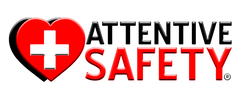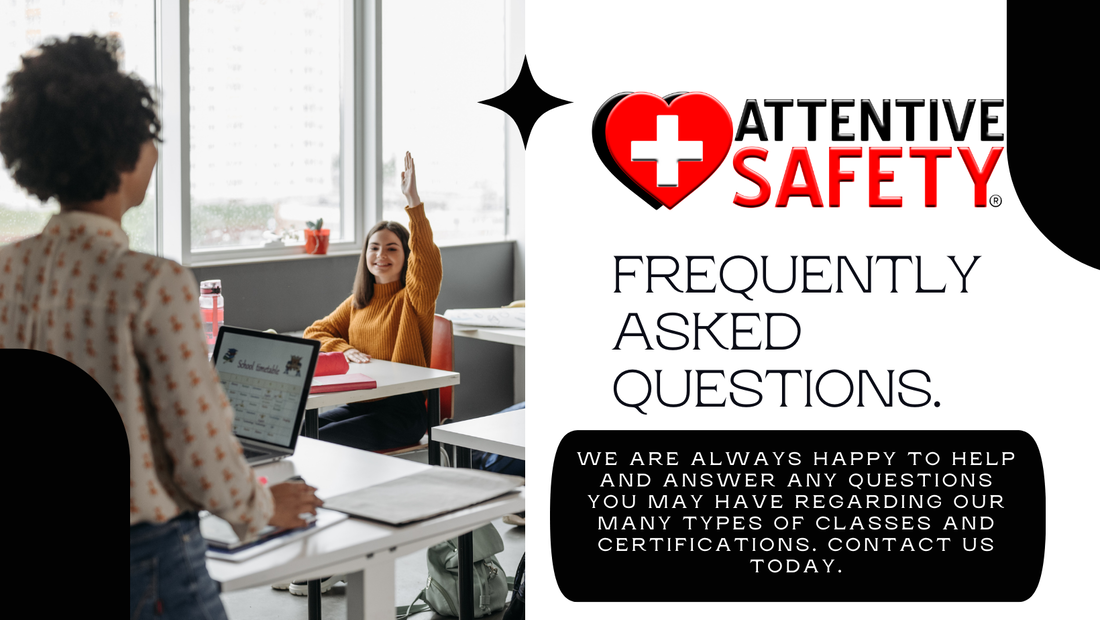Frequently Asked Questions
We are always happy to help and answer any questions you may have regarding our many types of classes and certifications.
We understand you might have questions about our classes and certifications. Here are some of the most frequently asked questions to assist you:
1. How Long are the Certifications Valid? All our certifications, including CPR, First Aid, BLS, Pediatric First Aid and CPR, ACLS, PALS, and PEARS, are valid for 2 years.
2. When Will I Receive My Certification Card? You will receive your certification card immediately after the class. No waiting required!
3. How Do I Become ServSafe Food Safety Certified? To become ServSafe Food Safety certified, pass the ServSafe Manager Certification Exam with a score of 75% or higher and meet your local regulatory requirements.
4. How Do I Become Recertified for ServSafe Food Safety? Retake the ServSafe Food Protection Manager Certification Examination before your current certification expires. Check local regulations for specific renewal requirements.
5. How Much Do CPR Certification Classes Cost? The cost varies based on the selected CPR certification. We offer affordable CPR certification classes across the U.S.A, including various American Heart Association courses.
6. Which CPR Class Do I Need? Healthcare professionals typically need the American Heart Association Basic Life Support for Healthcare Providers Class. Others should check with their employer or consider the American Heart Association Heartsaver First Aid & CPR AED Class.
7. How is the BLS Renewal Course Different from the Initial BLS Course? The renewal course is shorter, designed for those with existing BLS experience, focusing on efficiency and updated skills.
8. What is the Difference Between American Red Cross and American Heart Association Certifications? Both are widely accepted, but the American Heart Association is generally preferred in the medical field, especially for higher-level certifications like ACLS and PALS.
9. What's the Minimum Age to Take CPR? There's no age limit for CPR certification, but a minimum weight of 90lbs is recommended to effectively perform chest compressions.
10. Why Do Attentive Safety Classes Seem Shorter? Efficiency is increased as each student has their own manikin.
11. What if I'm Late? There’s a 15-minute grace period. Arrival beyond this may lead to refusal of admission by the Instructor.
12. Can I Get a Refund? All courses are non-refundable. Cancellations or absence result in forfeiture of payment.
13. How Do I Register?
14. What if I Need to Reschedule? Reschedule requests can be made at Reschedule Request
15. Can Any Provider Who Previously Took the Full BLS Course Take the Renewal Course? Yes, if you have an unexpired BLS Provider Card. The renewal course is offered in a classroom-based format.
Need More Information? For any further queries, don’t hesitate to contact us or visit our website. We’re here to help you on your journey to becoming certified and skilled in lifesaving techniques.
1. How Long are the Certifications Valid? All our certifications, including CPR, First Aid, BLS, Pediatric First Aid and CPR, ACLS, PALS, and PEARS, are valid for 2 years.
2. When Will I Receive My Certification Card? You will receive your certification card immediately after the class. No waiting required!
3. How Do I Become ServSafe Food Safety Certified? To become ServSafe Food Safety certified, pass the ServSafe Manager Certification Exam with a score of 75% or higher and meet your local regulatory requirements.
4. How Do I Become Recertified for ServSafe Food Safety? Retake the ServSafe Food Protection Manager Certification Examination before your current certification expires. Check local regulations for specific renewal requirements.
5. How Much Do CPR Certification Classes Cost? The cost varies based on the selected CPR certification. We offer affordable CPR certification classes across the U.S.A, including various American Heart Association courses.
6. Which CPR Class Do I Need? Healthcare professionals typically need the American Heart Association Basic Life Support for Healthcare Providers Class. Others should check with their employer or consider the American Heart Association Heartsaver First Aid & CPR AED Class.
7. How is the BLS Renewal Course Different from the Initial BLS Course? The renewal course is shorter, designed for those with existing BLS experience, focusing on efficiency and updated skills.
8. What is the Difference Between American Red Cross and American Heart Association Certifications? Both are widely accepted, but the American Heart Association is generally preferred in the medical field, especially for higher-level certifications like ACLS and PALS.
9. What's the Minimum Age to Take CPR? There's no age limit for CPR certification, but a minimum weight of 90lbs is recommended to effectively perform chest compressions.
10. Why Do Attentive Safety Classes Seem Shorter? Efficiency is increased as each student has their own manikin.
11. What if I'm Late? There’s a 15-minute grace period. Arrival beyond this may lead to refusal of admission by the Instructor.
12. Can I Get a Refund? All courses are non-refundable. Cancellations or absence result in forfeiture of payment.
13. How Do I Register?
- Visit Attentive Safety's Website
- Select your class and date
- Register and pay online to reserve your seat (at least 24 hours in advance)
14. What if I Need to Reschedule? Reschedule requests can be made at Reschedule Request
15. Can Any Provider Who Previously Took the Full BLS Course Take the Renewal Course? Yes, if you have an unexpired BLS Provider Card. The renewal course is offered in a classroom-based format.
Need More Information? For any further queries, don’t hesitate to contact us or visit our website. We’re here to help you on your journey to becoming certified and skilled in lifesaving techniques.

